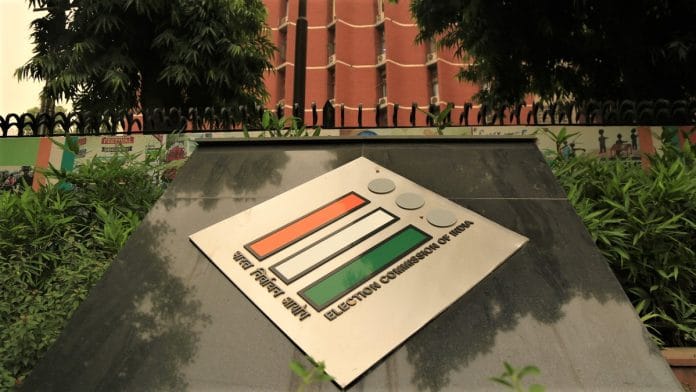New Delhi: Hours after the Election Commission (EC) was pulled up by the Supreme Court for not dealing with cases of hate speech sternly, the EC Monday debarred four prominent politicians from campaigning for violating the Model Code of Conduct (MCC).
The first two to be banned, under the EC’s special powers conferred to it by Article 324 of the Constitution, were Uttar Pradesh Chief Minister Yogi Adityanath — for 72 hours — and Mayawati — for 48 hours — starting 6 am Tuesday. The other two were Samajwadi Party leader Azam Khan, banned for 72 hours, and BJP leader and union minister Maneka Gandhi, banned for 48 hours. Their ban starts at 10am Tuesday.
The EC’s action comes just a day before the SC examines the powers of the poll body.
While the MCC is not legally binding, the EC is free to invoke its wide-ranging powers conferred under Article 324 to allow free and fair elections.
On Monday, the SC decided it would consider the EC’s ability to act against candidates for making speeches along religious and caste lines after a Public Interest Litigation (PIL) was filed on the issue.
As the EC invokes extraordinary powers to assert its institutional authority, and the Supreme Court is all set to examine the powers of the poll panel Tuesday, ThePrint looks at the extent of powers conferred on EC under Article 324.
Also read: This is not an easy time to be the Election Commission of India. Here’s why
What is Article 324?
According to Article 324, the “superintendence, direction and control of elections” is vested with the Election Commission of India — making it the highest authority when it comes to elections in the country.
The Supreme Court has weighed in on the extent of powers conferred to the commission under Article 324 on several occasions, and upheld them.
In 2001, in the Union of India versus Association of Democratic Reforms case, the SC said, “Article 324, in our view, operates in areas left unoccupied by legislation and the words ‘superintendence, direction and control, as well as ‘conduct of all elections’, are the broadest terms…
“In case where law is silent, Article 324 is a reservoir of power to act for the avowed purpose of having free and fair election. Constitution has taken care of leaving scope for exercise of residuary power by the Commission in its own right as a creature of the Constitution in the infinite variety of situations that may emerge from time to time in a large democracy, as every contingency could not be foreseen or anticipated by the enacted laws or the rules,” the court further said.
However, there can be some restrictions on the plenary character of Article 324. For example, when the Parliament or any state Legislature has legislated on an election related matter, the EC cannot violate the law or pass a contradictory order invoking Article 324.
Can EC’s decisions under Article 324 be challenged?
While there is pressure on the EC to invoke Article 324 and take decisions seen to be strong and decisive, and not just “slaps on the wrist”, such decisions have been challenged and the Supreme Court has ruled against the EC or taken a seemingly contradictory stance.
Take for example the ban imposed by EC on the biopic featuring Prime Minister Narendra Modi last week. While the EC took the decision to impose the ban taking a cue from the Supreme Court itself, the SC has now asked the poll panel to review its order.
Hearing an earlier petition challenging the release of the film when the MCC was in force, the SC had said, “Let the EC take a call.”
However, days after the decision, the SC has now asked the commission to reconsider the ban after watching the film. The SC, which will decide the matter Friday, could very well reverse the EC order now.
This is not the first time where an order passed by the EC may be struck down by the Supreme Court.
In 1998, using its powers under Article 324, the Election Commission had prohibited newspapers and news channels from publishing results of pre-election surveys and exit polls during a certain period during Lok Sabha elections and Assembly elections in a few states that year.
The ban was upheld by the SC when it was challenged in the court.
However, when the commission sought to impose the ban again in 1999 Lok Sabha elections, the matter was referred to a constitutional bench of the Supreme Court. The court questioned the validity of the order, and the EC was subsequently forced to withdraw it.
As recalled by the commission’s former legal advisor S.K. Mendiratta in a recent interview, while hearing the matter, the SC told the EC, “If you don’t have the powers to punish (for violation) on your own, why are you issuing such order?”
Also read: 66 ex-civil servants allege 9 model code violations, call Election Commission ‘weak-kneed’






